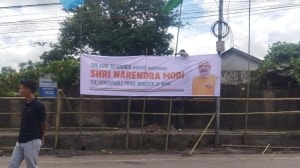Nervous Asians ask will city’s melting pot crack?
Early evening, as 21 of the dead lay outside King’s Cross station and rescuers struggled through a fear-struck city to reach to the oth...

Early evening, as 21 of the dead lay outside King’s Cross station and rescuers struggled through a fear-struck city to reach to the others, a few hundred metres away in Camden’s Drummond street, home to second-largest community of Bengali Muslims, there was unusual stillness.
Earlier in the day, the dreaded word Al Qaeda had been uttered—on TV and across the nation, provoked by a website posting by a group hitherto unknown.
In spite of their faith in Britain’s traditional multiculturalism, there was fear on what may follow the blasts.
‘‘This will test how strong Britain’s fabled melting pot is. Will it crumble as it did in the US?’’ said Ali Muhammad, who owns a retail store on the street. Though it’s only been hours, this question is spreading like a Chinese whisper in the Asian Muslim community here.
Camden is the second-largest Bengali Muslim area in London after East London. The street known for its string of Indian and vegetarian restaurant is home to 90,000 South Asians.
As swathes of commuters tried to walk London streets trying to find their way home without the underground, the Al Qaeda word had already come up more than once. Statements from leaders gathered for the G8 had flickered on television in small shops and restaurants here. US President George W. Bush, at the G8 summit in Gleneagles, said what has by now become his trademark refrain: ‘‘The war on terror goes on….we will find them, we will bring them to justice.’’
Tony Blair, who hours earlier, had talked of saving the world from global warming and poverty, was talking of terrorism too and saying how this was an attack on ‘‘our way of life.’’
It took only a couple of hours for the Islamic Human Rights Commission to warn London Muslims to stay at home to avoid any violence aimed at them. Though by evening, the warning seemed to err on the side of caution, it reflected the latent and gathering fear among the Muslim community.
Instead of the usual dinner rush-hour into the rows of these Indian restaurants, there were eerie sirens from ambulances and police cars. A few hundred metres away, a ripped off double-decker bus near Russell Square lay as a grim reminder of the events in the morning.
This was a day when Londoners were basking in the glow of a succesful Olympics bid. Less than 24 hours ago, the street had merry revellers eating and drinking, looking forward to a fun future, even if that was 2012.
The Muslims had played a part in the bid. Secretary-General of the Muslim Council of Britain Sir Iqbal Sacranie had even issued a statement embracing the bid and saying what it might do for Mulsim communities living in areas where massive development related to the Olympic games is to take place.
‘‘The Muslim community fully embraces London’s bid for the 2012 Games and we want to play an active role in supporting the effort,’’ he had said as one of the Bid Ambassadors.
In contrast, today’s drizzly morning brought bad tidings. Even when a bright sun did come up, Chutney Restaurant and Ambala Sweets were empty. Among the smaller shopkeepers, the fear was more palpable. The sight of yellow fluorescent police jackets is not something any community wants to be associated with it.
‘‘My heart sank when I heard it was a secret group of Al Qaeda’s jihad in Europe. The police and authorities are sure to keep an eye on us,’’ said Ali Hashmat who works in one of the restaurants on Drummond street.
Most of the South Asians admit, these were good times. The British economy was strong, unlike many in Europe, and it was more multicultural than ever. And this, they think, will make London different from the kind of backlash that was seen in the US following 9/11.
‘‘The level of interaction with the British community has been good. They understand us more and know more about us,’’ said Sohail Anwar, a banker trying to find his way home from his workplace in Camden.
Muhammad Ali, who is a customer relations manager at McDonalds, said London was one of the safest places to be in and the series of blasts was most unexpected. Ali Ashmat from Ali and Sons said that he was scared that he would have people coming and questioning him.
‘‘I want to see what Monday brings. Maybe things will be slow over the weekend,’’ said Tipu Jagirdar from Chutney Restaurant trying to be optimistic about the quiet street today. ‘‘There have been blasts with the IRA. The city as well as the people are used to this,’’ pointed out Anwar.
The emergency services worked like clockwork as the Hilton Hotel was turned into a make-shift place for the wounded and double-decker buses carried the wounded to the hospital.
Will London’s identity as a melting pot hold? The South Asian community in Britain is waiting and watching.
Photos





- 01
- 02
- 03
- 04
- 05


























